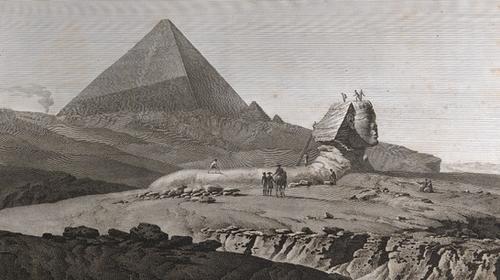French Military Expeditions in Italy (1796-99) and Egypt (1798-1801)
Trinity College Dublin
Principal Investigator: Professor John Horne
Project Member: Dr Joseph Clarke
Project Member: Dr Fergus Robson
This project examined the French Revolutionary campaigns in Italy and Egypt in the late 1790s in a comparative cultural context. Both expeditions involved large French forces in the conquest and occupation of two very distinct societies; both were represented as crusades to emancipate and enlighten oppressed peoples in the name of Revolutionary modernity and both sought to involve local elites, the giacobini in Italy and the ulama in Egypt, in this crusade. Both also generated particular ethnographic and historical discourses as each expedition encountered antiquity first hand. The project compared the soldiers’ experience and examined the assumptions that informed their mission as well as their interactions with the cultures they encountered.
In both Italy and Egypt, the expeditions’ legacy endured long after the French presence ended. Indeed, the last of the Description de l’Egypte’s twenty volumes appeared just before the French colonization of Algeria began in 1830 and this points to one of the project’s key research objectives. In examining these expeditions as cultural encounters, the research compared how Europeans confronted one another culturally during the Revolutionary wars and asked how this encounter changed when Europeans came face to face with non-European populations. The proximity of these expeditions in time, the politicization of the troops involved and the copious accounts many soldiers left of both campaigns allowed for a comparative study of the soldiers’ experience of war as a journey while also raising wider issues concerning their identity. In drawing this comparison, this study asked whether the French campaign in Egypt was imagined and articulated in terms of the essential ‘otherness’ of a non-Western society or whether this sense of radical alterity was already evident in Italy. If the soldiers of a secular Republic repeatedly used similar language to describe the ‘despotism’, ‘backwardness’ and ‘fanaticism’ they encountered in both Italy and Egypt, did they come to conceive of both societies in similar terms? How, above all, did the French use of force compare in each context and did ideas of ethnic identity or difference influence the French recourse to repression? In essence, were these expeditions experienced according to fundamentally different preconceptions or are both best understood in terms of a colonial ‘civilizing mission’ that understood the relationship between the occupiers and the occupied in terms of a perceived hierarchy of ethnicities and human progress? In this respect, this study engaged with recent debates concerning Woolf’s work on French perceptions of civilization and ethnicity and Broer’s controversial use of the term ‘cultural imperialism’ in a European context during this period.
This project was closely connected to the project about British and French expeditions to Italy, the Balkans and the Near East (1915-20). In both strands, the variables to be established were: the various forms of official and informal interaction between the expeditionary forces and the indigenous populations, those populations’ responses and the situation at the expedition’s end. The long-term effects of these cultural exchanges were beyond the scope of the study but the comparison between expeditions in different contexts and periods permitted wider questions to be asked concerning the relationships between Europeans and between Europe and the extra-European world over the long 19th century. In each case, research focused on a wide range of both official sources - campaign papers, military records, French postal control records etc, and personal testimonies - private correspondence, diaries, and memoirs reflecting the experience of both the occupier and the occupied.
